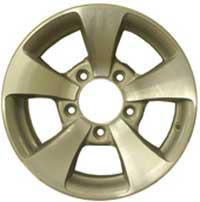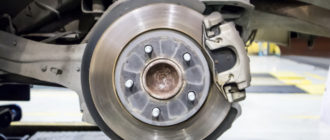If you’ve ever failed an emissions test, you know how frustrating and costly it can be to fix your car’s catalytic converter. But did you know that a failing catalytic converter can cause more than just a failed test? It can also cause damage to your engine and lead to costly repairs.
Here are five symptoms that could indicate your catalytic converter is failing:
1. Decreased Engine Performance: If you notice that your car is having trouble starting or accelerating, it could be a sign that your catalytic converter is clogged and not allowing air to flow through the exhaust system.
2. Louder Than Usual Exhaust: A noisy exhaust system could be a sign that your catalytic converter is damaged or missing altogether.
3. Smell of Rotten Eggs: If you notice a strong sulfur odor coming from your exhaust, it could be a sign that your catalytic converter is not converting hydrogen sulfide into sulfur dioxide properly.
4. Check Engine Light: If your check engine light comes on and stays on, it could be a sign that your catalytic converter is failing and needs to be replaced.
5. Poor Gas Mileage: A damaged or failing catalytic converter can cause your car to use more fuel than usual, leading to poor gas mileage.
If you notice any of these symptoms, it’s important to get your car checked out by a mechanic as soon as possible to avoid further damage and costly repairs.

source: https://www.cars.com/articles/what-are-common-catalytic-converter-problems-1420663031608/
- Decreased Performance and Acceleration: Signs of a Failing Catalytic Converter
- What Does the Check Engine Light Mean?
- Rattling Noises and Other Signs of a Failing Catalytic Converter
- Be wary of the smell of sulfur or rotten egg: Signs of a Failing Catalytic Converter
- Failed Emissions Test: A Warning Sign for a Failing Catalytic Converter
Decreased Performance and Acceleration: Signs of a Failing Catalytic Converter
A catalytic converter is an essential part of your car’s emissions control system, converting harmful pollutants into less harmful gases before they exit your vehicle’s exhaust system. A failing catalytic converter can cause a variety of problems, including decreased performance and acceleration.
If your car is struggling to pick up speed, particularly when accelerating from a standstill, it could be a sign that your catalytic converter is failing. This is because a clogged or damaged catalytic converter can restrict the flow of exhaust gases, preventing your engine from breathing properly and robbing it of power.
You may also notice decreased overall performance from your vehicle. This can manifest in a number of ways, such as reduced fuel efficiency, sluggishness when driving, and difficulty maintaining speed on the highway. If you notice any of these symptoms, it may be time to have your catalytic converter inspected.
- Other symptoms of a failing catalytic converter include:
- Check engine light – A malfunctioning catalytic converter can trigger your vehicle’s onboard diagnostic system, causing the check engine light to come on.
- Rattling noise – If the catalyst inside the converter begins to break apart, it can cause a rattling sound coming from the exhaust system.
- Sulfur smell – A failing converter can produce a sulfurous odor, similar to the smell of rotten eggs.
In conclusion, if you’re experiencing decreased performance and acceleration from your vehicle, it could be a sign of a failing catalytic converter. Pay attention to any other symptoms you may notice, and have your vehicle inspected by a qualified mechanic if you suspect there’s an issue with your converter.
What Does the Check Engine Light Mean?
The check engine light is one of the most important warning indicators in your car. It’s designed to alert you when there’s a problem with one of your car’s systems, including the catalytic converter. When the check engine light comes on, it’s important to take action right away to prevent further damage.
There are several signs of a failing catalytic converter to look out for. One symptom is reduced acceleration or power from your car. You may also notice your car’s engine running hotter than usual. Another potential symptom is a decrease in your car’s fuel efficiency. If you’re experiencing any of these symptoms, it’s time to get your car checked out.
You shouldn’t ignore the signs of a failing catalytic converter. In addition to causing damage to your car’s engine, failing to address the issue can result in fines and penalties from state emissions tests. Fortunately, replacing a catalytic converter is a relatively simple process that can be done by a qualified mechanic.
If you’re unsure what’s causing your check engine light to come on, it’s important to take your car in for an inspection. A qualified mechanic can diagnose the issue and recommend the best course of action. Remember, the check engine light is your car’s way of communicating with you, so don’t ignore it!
Rattling Noises and Other Signs of a Failing Catalytic Converter
A catalytic converter is a crucial part of a vehicle’s exhaust system and is responsible for converting harmful pollutants into less harmful ones. However, over time, a catalytic converter may start to fail, resulting in a variety of symptoms. One of the most common signs of a failing catalytic converter is rattling noises coming from underneath the car.
These noises may be caused by a broken internal ceramic honeycomb structure, which can cause the exhaust system to vibrate and create rattling noises. Other symptoms of a failing catalytic converter include a decrease in engine performance, a decrease in fuel efficiency, and a sulfur-like smell coming from the exhaust.
- If you notice any of these symptoms, it is important to address the issue as soon as possible. A failing catalytic converter can not only harm the environment but can also lead to further damage to your vehicle’s engine.
- Replacing a catalytic converter can be expensive, but ignoring the issue can be even more costly in the long run. Make sure to have your vehicle inspected by a qualified mechanic if you notice any unusual sounds or smells coming from your exhaust system.
Regular maintenance and inspections can help prevent a catalytic converter from failing prematurely. Keeping up with routine maintenance such as oil changes and replacing worn-out spark plugs can also help improve engine performance and fuel efficiency. Don’t ignore the signs of a failing catalytic converter – taking action early can save you time and money in the long run.

source: https://cartreatments.com/catalytic-converter-symptoms-and-replacement-cost/
Be wary of the smell of sulfur or rotten egg: Signs of a Failing Catalytic Converter
The catalytic converter is an essential component in your car’s exhaust system. Its purpose is to reduce the harmful emissions that come out of your car’s tailpipe by converting them into less harmful elements such as nitrogen, carbon dioxide, and water vapor.
However, a failing catalytic converter can produce some serious symptoms that should not be ignored. One of the most noticeable symptoms is the smell of sulfur or rotten egg. This smell is a clear indication that your catalytic converter is failing and needs to be replaced as soon as possible.
Ignoring the smell of sulfur or rotten egg can lead to more severe issues with your car’s exhaust system. Other symptoms may include sluggish acceleration, difficulty starting your car, decreased fuel efficiency, and even engine misfires. All of these symptoms are a warning that your catalytic converter needs attention.
- If you suspect that your catalytic converter is failing, it’s crucial to schedule an appointment with a qualified mechanic as soon as possible.
- They’ll be able to diagnose the issue and replace your catalytic converter before it causes more significant problems.
- Replacing a catalytic converter can be expensive, but it’s essential to keep your car running smoothly and reduce your impact on the environment.
In conclusion, be on the lookout for the smell of sulfur or rotten egg. If you notice this smell, don’t ignore it, and take action to replace your failing catalytic converter promptly.
Failed Emissions Test: A Warning Sign for a Failing Catalytic Converter
When your car fails an emissions test, it means that the levels of harmful pollutants in its exhaust gases exceed the allowable limits. One of the main reasons for failing an emissions test is a faulty catalytic converter. The catalytic converter is a device that converts the harmful gases from your car’s exhaust into harmless ones before they are released into the atmosphere. Over time, the catalytic converter can wear out or become clogged, which can lead to a decrease in its efficiency and an increase in harmful emissions.
If you ignore the warning signs of a failing catalytic converter, you may be putting yourself and the environment at risk. In addition to failing an emissions test, other symptoms of a failing catalytic converter include decreased fuel efficiency, reduced engine performance, unusual smells coming from your car’s exhaust, and a loud rumbling noise. If you notice any of these symptoms, it is important to get your car checked by a professional mechanic as soon as possible.
Replacing a faulty catalytic converter can be expensive, but it is necessary to ensure that your car is not emitting harmful pollutants into the air. In some cases, you may be able to get a replacement catalytic converter covered by your car’s warranty or through a government program. However, it is important to remember that failing to replace a faulty catalytic converter can result in fines or even a suspension of your car’s registration, depending on where you live.
- Don’t ignore the warning signs of a failing catalytic converter.
- Get your car checked by a professional mechanic if you notice decreased fuel efficiency, reduced engine performance, unusual smells coming from your car’s exhaust, a loud rumbling noise, or if your car fails an emissions test.
- Replacing a faulty catalytic converter may be expensive, but it is necessary to ensure that your car is not emitting harmful pollutants into the air.
- Take advantage of government programs or your car’s warranty to help cover the cost of a new catalytic converter if possible.
The key symptoms of a failing catalytic converter include decreased fuel efficiency, engine misfiring or stalling, the smell of sulfur or rotten eggs from the exhaust, and the illumination of the check engine light.
Yes, a failing catalytic converter can cause engine damage. If it becomes clogged, it can restrict exhaust flow and cause back pressure, which can damage engine components such as the exhaust valves and O2 sensors.
A catalytic converter may fail for several reasons, including physical damage caused by road debris, exposure to high temperatures, engine misfires or running rich, contaminated fuel, or age and wear and tear.
It is not safe to drive with a failing catalytic converter as it can cause further damage to the engine and emit harmful pollutants into the air. It is recommended to have it checked and repaired as soon as possible.
The cost of replacing a catalytic converter can vary depending on the make and model of the vehicle and the location of repair. On average, it can cost anywhere from $500 to $2500 for parts and labor.
It is possible to clean a catalytic converter with special cleaning solutions, but it is not always effective in restoring its function. If the damage is severe, it may need to be replaced. Some smaller repairs, such as replacing damaged heat shields, can be made to prolong the life of the converter.
Regular maintenance of a vehicle's engine and exhaust system can help prevent premature failure of the catalytic converter. This includes replacing worn spark plugs, fixing any engine misfires or running rich, using high quality gasoline, and avoiding driving on rough terrain.
Is your car's engine struggling to perform like it used to? It could be time to change your engine air filter. Here are 5 signs that indicate it's time to make a change. Don't ignore these warning signals, keep your car running smoothly with a clean air filter.






